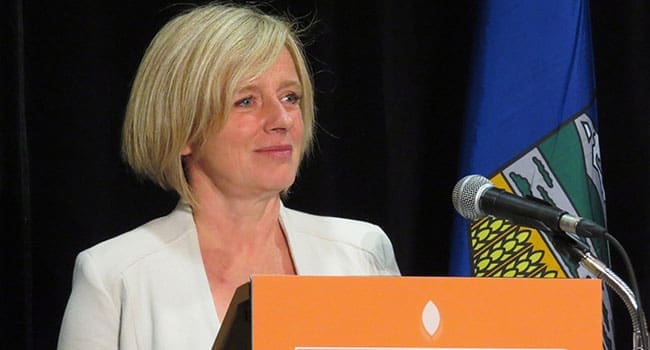 The gods of fortune have not been kind to Alberta’s new NDP government. Bold steps are needed before it’s too late.
The gods of fortune have not been kind to Alberta’s new NDP government. Bold steps are needed before it’s too late.
The provincial economy is sinking deeper into recession, the budget is drowning in red ink and the oil industry – far from leading an innovative revival – is laying off staff and stalking government corridors looking for bailouts.
Regrettably, the government seems to be playing it safe. While strategies to deal with coal-fired power plants and a carbon tax are perhaps overdue, action on the larger crisis has been restrained and – dare I say – conservative.
Premier Rachel Notley’s government has surrounded itself with distinguished advisors including David Dodge, Andrew Leach, Dave Mowat (CEO of ATB Financial) and, most recently, Terry Boston, the former CEO of PJM Interconnection. Regrettably, these gentlemen are all small ‘c’ conservatives with in-the-box ideas.
This cautious approach would not be without merit in normal times. NDP governments in other jurisdictions have been accused of being too radical and paid heavily for their mistakes.
But these are not normal times in Alberta. Steering centralist, status quo policy will almost inevitably lead to a replication of the NDP’s fate in Nova Scotia. Electoral victory in 2009 was followed by four years of ‘sensible’ policy making in a declining economy. Today, Nova Scotia’s NDP are back in the political wilderness.
Not surprisingly, the Alberta public is getting restless. A recent Angus Reid poll shows declining approval ratings for both the NDP government and Notley, its star leader.
According to party insiders, this rough patch is to be expected. They project that after all the tough decisions have been made this year, calmer waters will greet the government in future.
Good luck.
What’s the consensus going to be 12 months from now, when oil prices do not recover, when Alberta’s unemployment rate doubles again to 16 percent, when Depression-era lineups begin to form at food banks? At that point it will be too late to start getting experimental.
While minor adjustments to the corporate tax rate will win applause in conservative business circles, incremental reforms will not get the job done. The real question facing the government is not whether to make fundamental changes, but which fundamental reforms to make? What kind of economy do we want to build in Alberta?
The challenge boils down to finding ways to put the energy industry back on a sound footing while sparking the newer creative economy that Alberta’s millennial generation inhabit.
The oil business is in tough shape. Saudi Arabia and other Organization of Petroleum Exporting Countries (OPEC) members have targeted Alberta’s expensive oilsands for destruction. Combined with public distrust in pipelines, there is little hope for a recovery at least in the short to medium term.
The Alberta government could, however, take bold steps to help create a national energy strategy. In tandem with the federal government, Alberta could set a Canadian price for oil high enough to encourage renewable energy growth, then prohibit imports of OPEC crude and transport Western crude to refineries in Ontario, Quebec and the Maritimes. This strategy would save the Canadian oil industry and make the nation self-sufficient in energy.
Fortunately, Alberta also has a few other arrows in its quiver. How many governments own a bank? The Alberta government does: ATB Financial (formally Alberta Treasury Branch).
ATB Financial operates like a stodgy, private sector, commercial bank. But it could be renewed and reinvigorated to become what it was originally intended to be: Alberta’s public banking saviour.
The new creative economy is much different than the old industrial one. The economy of Alberta’s youth is driven by intangibles: the economic value imbedded in services and other creative industries like the movie business, digital apps, software, patented inventions. There’s even intangible asset value in carbon credits and communities of practice (value networks).
According to the World Bank, these assets now make up more than 75 percent of post-industrial economies. Yet conventional banks don’t recognize these new assets or lend against them. Perhaps it’s time for the government to do Alberta’s millennial generation a favour and get the bank it owns to start innovating in the public interest.
It might well save the economy and the NDP government.
Robert McGarvey is an economic historian and former managing director of Merlin Consulting, a London, U.K.-based consulting firm. Robert’s most recent book is Futuromics: A Guide to Thriving in Capitalism’s Third Wave.
Robert is a Troy Media contributor. Why aren’t you?
The views, opinions and positions expressed by columnists and contributors are the author’s alone. They do not inherently or expressly reflect the views, opinions and/or positions of our publication.


